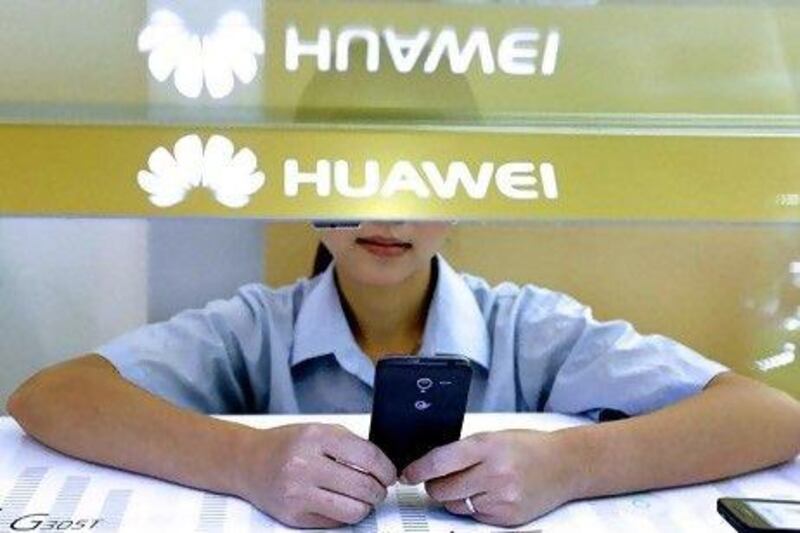The United States is considering banning imports from China's top telecoms equipment makers, believing they pose a serious security threat.
Telecommunications equipment of the kind manufactured by Huawei and ZTE powers computerised controls not only for power grids, banking and finance systems, but also gas, oil and water systems and rail and shipping, hence Washington's concern.
Although ZTE and Huawei both vociferously deny that they are involved in facilitating any type of political or industrial espionage, a congressional report has recommended that American companies should not buy communications equipment from Huawei and ZTE, believing them to be long-term security risks.
Mike Rogers, the chairman of the congressional permanent select committee on intelligence, said "China is known to be the major perpetrator of cyber-espionage", and Huawei and ZTE failed to alleviate serious concerns "throughout this important investigation". American businesses should use other vendors, he said.
Rob Enderle of the Silicon Valley analyst Enderle Group says there have been growing concerns that Chinese technology has the means to allow for monitoring of its citizens and ways to monitor foreign governments and companies. That, he said, "is likely what triggered this series of events".
Meanwhile, the US telecoms network equipment giant Cisco is understood to be terminating its long-standing sales partnership with ZTE after an internal investigation into allegations the Chinese firm sold Cisco networking gear to Iran.
According to Silicon Valley industry watchers the move to ban Chinese imports could benefit Cisco, which would no longer have to compete with the Chinese in its home market. It could also be a huge potential help to Apple in the long term.
Reports that Apple's pace of innovation has slowed and that its latest smartphone, the iPhone 5, fails to raise the industry bar in the manner of previous models, is fuelling speculation that ZTE is preparing to try to oust the American company as market leader.
Chinese manufacturers are able to create products very similar to those made in the West but at a far lower price. While ZTE may seem to pose only a marginal threat to Apple in today's market, it has the potential to undercut Apple.
The profit margins that have turned the Silicon Valley computer maker into the world's biggest company would be radically slashed should a rival such as ZTE be able to lure its customers away with similar products.
But some American observers believe the move to ban imports from ZTE and Huawei to the US will not escalate into a full trade war and that the congressional report should be seen in the context of this being an election year when there is widespread voter anger at US blue-collar jobs being outsourced to China.
"This would seem to be an unusual way to approach the problem of trade imbalance," says Mr Enderle, "because it focuses on companies that don't sell well into the US anyway, rather than those that do".
He argues that the telecoms ban would be protecting the US digital communications industry from Chinese infringement when the US has already shifted much of its manufacturing elsewhere, such as to China and Taiwan.
"In fact it likely would have a bigger impact on Taiwan versus China on trade than it would on the US versus China," says Mr Enderle.
He adds that the proposed ban takes little account of the fact that manufacturers such as Apple routinely have their products made by Chinese sub-contractors.
Apple relies on Taiwan's Foxconn to produce its upmarket smartphones and computer tablets. The company's Chinese facility has been plagued by allegations of unacceptable working practices in the wake of a rash of employee suicides.
"There could be a political motive in that it might appear to showcase an administration protecting US jobs," says Mr Enderle. "But given these firms don't really sell into the US, it probably wouldn't upset China as much as [targeting] a firm like Foxconn," which employs a large number of Chinese workers.
It also seems unlikely that China is preparing to retaliate by banning US goods or forbidding its own manufacturers to export to the US. The effects of losing its most lucrative overseas market would be devastating for the Chinese economy.
"A trade war is unlikely because we buy more of China's goods than they buy ours right now," says Mr Enderle.
Bryan Wang, an analyst at the research firm Forrester, says there will not be a huge trade war between the two countries. "The bottom line is that the importance of Sino-US trading is a lot higher than just this case."
However, the industry should not entirely discount US fears of digital espionage as a catalyst for a trade war in the future. Fears of a massive cyber attack on the US power grid or financial system may be purely theoretical today.
Should such an attack be traced to a Chinese organisation, there is little doubt that Washington would be likely to impose truly draconian trade restrictions.





